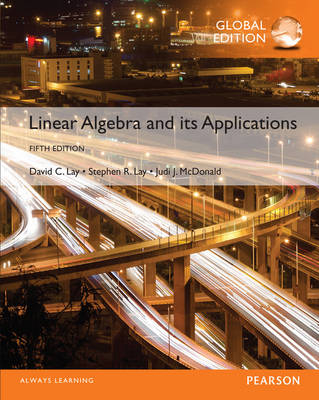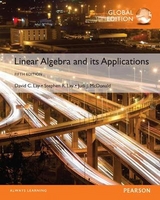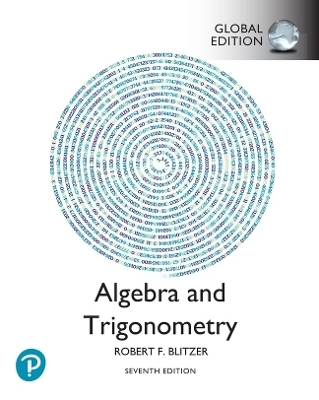
Linear Algebra and Its Applications with MyMathLab, Global Edition
Pearson Education Limited
978-1-292-09234-8 (ISBN)
- Titel erscheint in neuer Auflage
- Artikel merken
Important information for students:
You need both an access code and a course ID to access MyMathLab. Ask your lecturer before purchasing a MyLab product as you will need a course ID from them before you can gain access to the system.
This package includes MyMathLab (R).
With traditional linear algebra texts, the course is relatively easy for students during the early stages as material is presented in a familiar, concrete setting. However, when abstract concepts are introduced, students often hit a wall. Instructors seem to agree that certain concepts (such as linear independence, spanning, subspace, vector space, and linear transformations) are not easily understood and require time to assimilate. These concepts are fundamental to the study of linear algebra, so students' understanding of them is vital to mastering the subject. This text makes these concepts more accessible by introducing them early in a familiar, concrete Rn setting, developing them gradually, and returning to them throughout the text so that when they are discussed in the abstract, students are readily able to understand.
This package includes MyMathLab, an online homework, tutorial, and assessment program designed to work with this text to personalize learning and improve results. With a wide range of interactive, engaging, and assignable activities, students are encouraged to actively learn and retain tough course concepts.
MyMathLab should only be purchased when required by an instructor. Please be sure you have the correct ISBN and Course ID. Instructors, contact your Pearson representative for more information.
Find out more at www.MyMathLab.com
1. Linear Equations in Linear Algebra
Introductory Example: Linear Models in Economics and Engineering
1.1 Systems of Linear Equations
1.2 Row Reduction and Echelon Forms
1.3 Vector Equations
1.4 The Matrix Equation Ax = b
1.5 Solution Sets of Linear Systems
1.6 Applications of Linear Systems
1.7 Linear Independence
1.8 Introduction to Linear Transformations
1.9 The Matrix of a Linear Transformation
1.10 Linear Models in Business, Science, and Engineering
Supplementary Exercises
2. Matrix Algebra
Introductory Example: Computer Models in Aircraft Design
2.1 Matrix Operations
2.2 The Inverse of a Matrix
2.3 Characterizations of Invertible Matrices
2.4 Partitioned Matrices
2.5 Matrix Factorizations
2.6 The Leontief Input-Output Model
2.7 Applications to Computer Graphics
2.8 Subspaces of Rn
2.9 Dimension and Rank
Supplementary Exercises
3. Determinants
Introductory Example: Random Paths and Distortion
3.1 Introduction to Determinants
3.2 Properties of Determinants
3.3 Cramer's Rule, Volume, and Linear Transformations
Supplementary Exercises
4. Vector Spaces
Introductory Example: Space Flight and Control Systems
4.1 Vector Spaces and Subspaces
4.2 Null Spaces, Column Spaces, and Linear Transformations
4.3 Linearly Independent Sets; Bases
4.4 Coordinate Systems
4.5 The Dimension of a Vector Space
4.6 Rank
4.7 Change of Basis
4.8 Applications to Difference Equations
4.9 Applications to Markov Chains
Supplementary Exercises
5. Eigenvalues and Eigenvectors
Introductory Example: Dynamical Systems and Spotted Owls
5.1 Eigenvectors and Eigenvalues
5.2 The Characteristic Equation
5.3 Diagonalization
5.4 Eigenvectors and Linear Transformations
5.5 Complex Eigenvalues
5.6 Discrete Dynamical Systems
5.7 Applications to Differential Equations
5.8 Iterative Estimates for Eigenvalues
Supplementary Exercises
6. Orthogonality and Least Squares
Introductory Example: The North American Datum and GPS Navigation
6.1 Inner Product, Length, and Orthogonality
6.2 Orthogonal Sets
6.3 Orthogonal Projections
6.4 The Gram-Schmidt Process
6.5 Least-Squares Problems
6.6 Applications to Linear Models
6.7 Inner Product Spaces
6.8 Applications of Inner Product Spaces
Supplementary Exercises
7. Symmetric Matrices and Quadratic Forms
Introductory Example: Multichannel Image Processing
7.1 Diagonalization of Symmetric Matrices
7.2 Quadratic Forms
7.3 Constrained Optimization
7.4 The Singular Value Decomposition
7.5 Applications to Image Processing and Statistics
Supplementary Exercises
8. The Geometry of Vector Spaces
Introductory Example: The Platonic Solids
8.1 Affine Combinations
8.2 Affine Independence
8.3 Convex Combinations
8.4 Hyperplanes
8.5 Polytopes
8.6 Curves and Surfaces
9. Optimization (Online Only)
Introductory Example: The Berlin Airlift
9.1 Matrix Games
9.2 Linear Programming-Geometric Method
9.3 Linear Programming-Simplex Method
9.4 Duality
10. Finite-State Markov Chains (Online Only)
Introductory Example: Googling Markov Chains
10.1 Introduction and Examples
10.2 The Steady-State Vector and Google's PageRank
10.3 Communication Classes
10.4 Classification of States and Periodicity
10.5 The Fundamental Matrix
10.6 Markov Chains and Baseball Statistics
Appendices
A. Uniqueness of the Reduced Echelon Form
B. Complex Numbers
| Erscheint lt. Verlag | 9.7.2015 |
|---|---|
| Verlagsort | Harlow |
| Sprache | englisch |
| Maße | 204 x 258 mm |
| Gewicht | 996 g |
| Themenwelt | Schulbuch / Wörterbuch ► Schulbuch / Berufs- und Fachschule |
| Mathematik / Informatik ► Mathematik ► Algebra | |
| ISBN-10 | 1-292-09234-3 / 1292092343 |
| ISBN-13 | 978-1-292-09234-8 / 9781292092348 |
| Zustand | Neuware |
| Informationen gemäß Produktsicherheitsverordnung (GPSR) | |
| Haben Sie eine Frage zum Produkt? |
aus dem Bereich

